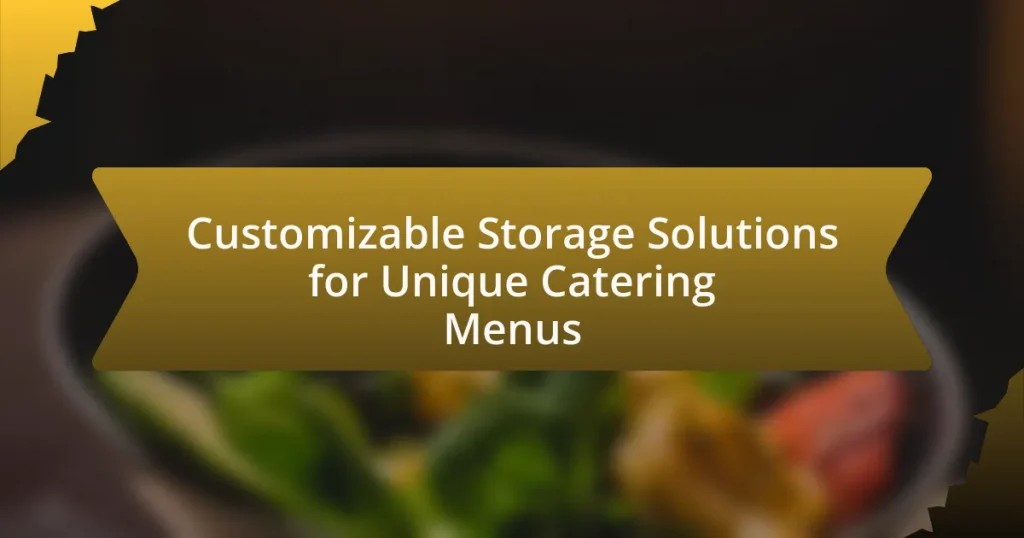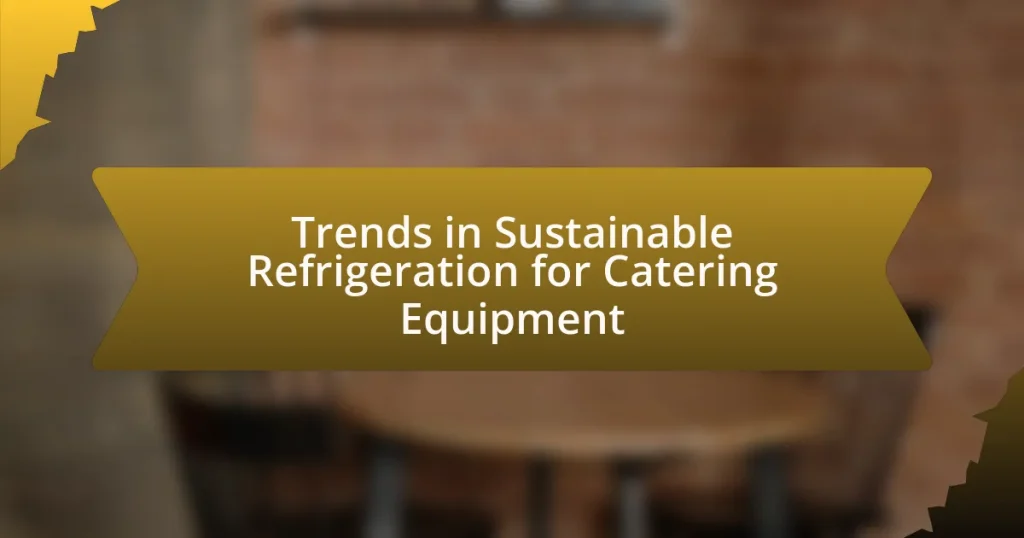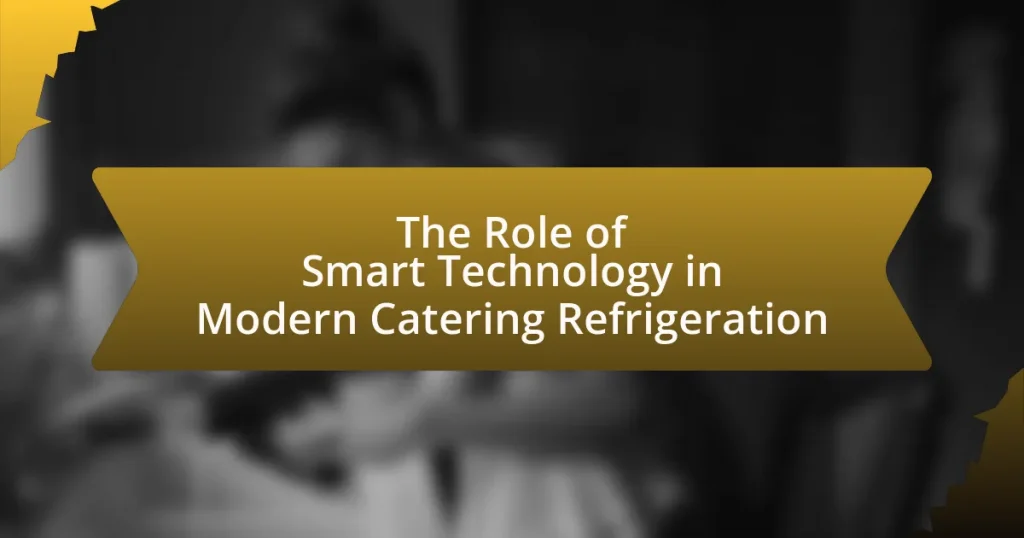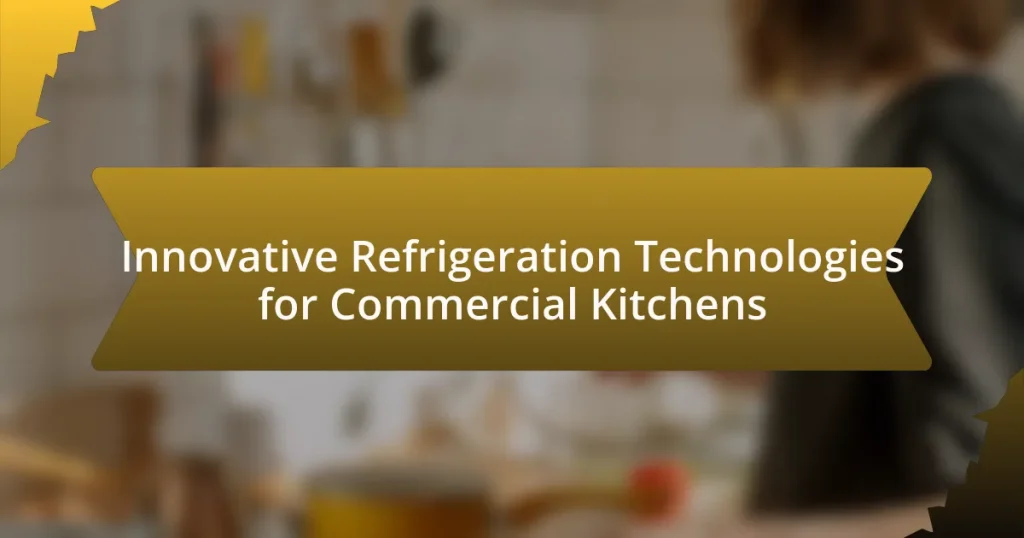Customizable storage solutions for unique catering menus are specialized systems designed to efficiently organize and preserve diverse food items. These solutions include modular shelving, adjustable containers, and temperature-controlled units that enhance workflow and food safety. The article explores how these storage options improve catering operations by optimizing space, reducing food waste, and ensuring quick access to ingredients. It also discusses the specific features that make these solutions adaptable to various menu requirements, the importance of material selection for durability, and best practices for implementation and maintenance. Additionally, it addresses common challenges caterers face without these solutions and offers strategies for effective inventory management.
What are Customizable Storage Solutions for Unique Catering Menus?
Customizable storage solutions for unique catering menus are specialized containers and systems designed to accommodate diverse food items and presentation styles. These solutions include modular storage units, adjustable shelving, and temperature-controlled containers that can be tailored to specific menu requirements. For instance, using stackable bins allows caterers to efficiently organize various ingredients while maintaining easy access, thus enhancing workflow and presentation. Additionally, customizable labeling systems can help identify different dishes quickly, ensuring that catering staff can serve clients efficiently.
How do customizable storage solutions enhance catering operations?
Customizable storage solutions enhance catering operations by providing tailored organization and accessibility for diverse menu items. These solutions allow caterers to efficiently store various ingredients and equipment, optimizing space and reducing preparation time. For instance, modular shelving and adjustable containers can accommodate different sizes and types of food products, ensuring that everything is easily accessible during events. This adaptability leads to improved workflow and minimizes the risk of cross-contamination, which is crucial in food safety. Additionally, studies show that effective storage management can increase operational efficiency by up to 30%, directly impacting service quality and customer satisfaction.
What specific features make storage solutions customizable?
Customizable storage solutions feature modular designs, adjustable shelving, and various compartment sizes that allow users to tailor the storage space to their specific needs. Modular designs enable users to add or remove sections based on the volume of items stored, while adjustable shelving accommodates different heights of containers or equipment. Additionally, various compartment sizes facilitate the organization of diverse items, ensuring efficient use of space. These features collectively enhance the flexibility and functionality of storage solutions, making them suitable for unique catering menus that require specific storage arrangements.
How do these features cater to unique menu requirements?
Customizable storage solutions cater to unique menu requirements by allowing flexibility in organizing and preserving diverse food items. These features enable caterers to adjust storage configurations based on specific menu needs, such as accommodating various portion sizes, dietary restrictions, and ingredient types. For instance, adjustable shelving and temperature zones ensure that perishable items are stored at optimal conditions, which is crucial for maintaining food safety and quality. Additionally, modular designs facilitate easy reconfiguration to adapt to changing menu demands, thereby enhancing operational efficiency and responsiveness in catering services.
Why are customizable storage solutions important for caterers?
Customizable storage solutions are important for caterers because they allow for efficient organization and management of diverse ingredients and equipment tailored to specific catering needs. Caterers often handle a wide variety of menu items, which require different storage conditions and space configurations; customizable solutions enable them to optimize their storage based on the unique demands of each event. For instance, a study by the National Association of Catering Executives highlights that effective storage management can reduce food waste by up to 30%, demonstrating the tangible benefits of tailored storage systems in maintaining ingredient freshness and accessibility.
What challenges do caterers face without these solutions?
Caterers face significant challenges without customizable storage solutions, including inefficiencies in food preservation and increased risk of spoilage. Without tailored storage options, maintaining the quality and safety of diverse menu items becomes difficult, leading to potential food waste. Additionally, the lack of appropriate storage can hinder the ability to organize and access ingredients quickly, resulting in delays during service. These operational inefficiencies can ultimately impact customer satisfaction and profitability, as caterers struggle to deliver fresh and timely meals.
How do customizable solutions improve food safety and quality?
Customizable solutions enhance food safety and quality by allowing tailored storage and handling practices that meet specific food types and operational needs. These solutions can include adjustable temperature controls, humidity management, and specialized compartments that prevent cross-contamination, ensuring that food is stored under optimal conditions. For instance, a study by the Food Safety and Inspection Service indicates that maintaining proper temperature and humidity levels can reduce the risk of foodborne illnesses by up to 50%. By implementing customizable storage solutions, catering operations can effectively manage diverse menu items, thereby improving overall food safety and quality.
What types of customizable storage solutions are available for catering?
Customizable storage solutions for catering include modular shelving units, portable food storage containers, and adjustable racks. Modular shelving units allow caterers to configure their storage space according to specific needs, maximizing efficiency and accessibility. Portable food storage containers are designed to keep food fresh and organized during transport, often featuring customizable compartments for different menu items. Adjustable racks provide flexibility in storing various sizes of equipment and supplies, accommodating the diverse needs of catering operations. These solutions enhance organization and streamline workflow, which is essential for successful catering services.
How do different storage options cater to various menu types?
Different storage options cater to various menu types by providing tailored solutions that maintain food quality, safety, and accessibility. For instance, refrigerated storage is essential for perishable items in menus featuring fresh salads or seafood, ensuring they remain at safe temperatures to prevent spoilage. Conversely, dry storage is suitable for non-perishable items like canned goods or grains, which are common in menus that emphasize pantry staples. Additionally, specialized storage solutions, such as heated cabinets, support menus that include hot dishes, keeping them at optimal serving temperatures. Each storage type is designed to meet the specific needs of different food items, thereby enhancing the overall catering experience.
What are the benefits of modular storage systems?
Modular storage systems offer flexibility, efficiency, and scalability for organizing and managing space effectively. These systems can be easily reconfigured to adapt to changing needs, allowing for optimal use of available space. Additionally, modular storage solutions can enhance accessibility and organization, making it easier to locate and retrieve items quickly. According to a study by the National Association of Professional Organizers, efficient storage solutions can increase productivity by up to 25%, demonstrating the tangible benefits of implementing modular systems in various settings.
How do temperature-controlled storage units support unique menus?
Temperature-controlled storage units support unique menus by preserving the quality and freshness of diverse ingredients. These units maintain specific temperature ranges that are crucial for storing perishable items, such as seafood, dairy, and specialty produce, which are often integral to unique culinary offerings. For instance, a study by the Food and Drug Administration highlights that proper refrigeration can extend the shelf life of fresh ingredients by up to 50%, ensuring that caterers can offer seasonal and specialty dishes without compromising on taste or safety. This capability allows chefs to experiment with innovative recipes and maintain a high standard of food quality, ultimately enhancing the overall dining experience.
What materials are commonly used in customizable storage solutions?
Common materials used in customizable storage solutions include wood, metal, plastic, and fabric. Wood is favored for its durability and aesthetic appeal, often used in shelving and cabinetry. Metal, such as steel or aluminum, provides strength and is commonly utilized in racks and frames. Plastic is lightweight and versatile, frequently found in bins and containers. Fabric is used in soft storage options like bags and organizers, offering flexibility and ease of transport. These materials are selected based on their functionality, durability, and suitability for various catering needs.
How do material choices impact durability and maintenance?
Material choices significantly impact durability and maintenance by determining how well a storage solution withstands wear and tear while affecting the frequency and type of upkeep required. For instance, materials like stainless steel offer high durability and resistance to corrosion, making them easier to maintain over time compared to wood, which may require regular sealing and treatment to prevent damage from moisture and pests. Additionally, high-density polyethylene (HDPE) is known for its resistance to impact and chemicals, reducing the likelihood of damage and the need for repairs. Studies show that selecting durable materials can extend the lifespan of storage solutions, thereby minimizing long-term maintenance costs and efforts.
What role does sustainability play in material selection?
Sustainability plays a crucial role in material selection by prioritizing environmentally friendly options that minimize ecological impact. This approach encourages the use of renewable resources, reduces waste, and promotes recycling, which is essential in industries like catering where packaging and storage materials are significant. For instance, selecting biodegradable or compostable materials can significantly decrease landfill contributions, aligning with sustainability goals. Additionally, studies indicate that sustainable material choices can enhance brand reputation and customer loyalty, as consumers increasingly prefer businesses that demonstrate environmental responsibility.
How can caterers effectively implement customizable storage solutions?
Caterers can effectively implement customizable storage solutions by assessing their specific needs and selecting modular storage systems that can be tailored to various menu items. This approach allows for efficient organization and easy access to ingredients and equipment, which is crucial for maintaining food quality and service speed. For instance, using adjustable shelving and bins can accommodate different container sizes and types, enhancing flexibility. Additionally, integrating inventory management software with storage solutions can streamline tracking and replenishment processes, ensuring that caterers maintain optimal stock levels.
What steps should caterers take to assess their storage needs?
Caterers should conduct a thorough inventory assessment to determine their storage needs. This involves cataloging all ingredients, equipment, and supplies, while considering the volume and frequency of use. Additionally, caterers must evaluate the types of food they prepare, as different items require varying storage conditions, such as temperature control or humidity levels. Analyzing past catering events can provide insights into peak storage demands, helping to identify trends in ingredient usage. Finally, caterers should consider the layout and accessibility of their storage space to optimize efficiency and ensure compliance with food safety regulations.
How can caterers evaluate the space available for storage solutions?
Caterers can evaluate the space available for storage solutions by conducting a thorough assessment of their operational area, including measuring dimensions and identifying potential storage locations. This evaluation involves analyzing the layout of the kitchen and storage areas, considering vertical space for shelving, and ensuring accessibility for inventory management. Additionally, caterers should account for the types of items to be stored, such as perishable goods requiring refrigeration or dry goods needing shelving, which influences the design and arrangement of storage solutions. By systematically measuring and planning, caterers can optimize their storage capacity to meet the demands of unique catering menus.
What factors should be considered when choosing a storage provider?
When choosing a storage provider, factors such as security, capacity, accessibility, and cost must be considered. Security ensures that stored items are protected from theft or damage, while capacity determines if the provider can accommodate the specific volume of goods needed for catering. Accessibility is crucial for timely retrieval of items, especially in catering where freshness is key. Cost must align with the budget while providing value through services offered. These factors collectively influence the effectiveness and reliability of the storage solution for unique catering menus.
What best practices should caterers follow when using customizable storage solutions?
Caterers should prioritize organization, temperature control, and accessibility when using customizable storage solutions. Effective organization involves categorizing items by type and usage frequency, which enhances efficiency during service. Maintaining appropriate temperature settings is crucial for food safety, as per the USDA guidelines, which recommend keeping cold foods at 40°F or below and hot foods at 140°F or above. Additionally, ensuring easy accessibility to frequently used items minimizes service delays and improves workflow. Implementing these best practices not only optimizes storage but also enhances overall catering operations.
How can caterers ensure optimal organization and accessibility?
Caterers can ensure optimal organization and accessibility by implementing customizable storage solutions tailored to their unique menus. These solutions include modular shelving, labeled containers, and mobile carts that facilitate easy access to ingredients and equipment. Research indicates that organized storage can reduce preparation time by up to 30%, enhancing efficiency during events. Additionally, utilizing clear labeling systems allows staff to quickly locate items, minimizing disruptions and ensuring a smooth workflow.
What maintenance routines are essential for longevity of storage solutions?
Regular cleaning, temperature monitoring, and periodic inspections are essential maintenance routines for the longevity of storage solutions. Cleaning prevents contamination and buildup of residues that can affect food quality, while maintaining optimal temperature ensures that perishable items remain safe and fresh. Periodic inspections help identify wear and tear or potential issues before they escalate, ensuring that storage solutions function effectively over time. These practices are supported by food safety guidelines, which emphasize the importance of cleanliness and proper storage conditions in preserving food integrity.
What common challenges do caterers face with customizable storage solutions?
Caterers commonly face challenges such as limited space, high costs, and complexity in managing customizable storage solutions. Limited space can restrict the ability to store various ingredients and equipment needed for diverse menus, making it difficult to maintain organization and efficiency. High costs associated with purchasing and maintaining specialized storage units can strain budgets, particularly for small catering businesses. Additionally, the complexity of managing multiple storage configurations can lead to inefficiencies and errors in inventory management, impacting overall service delivery. These challenges highlight the need for effective planning and resource allocation in catering operations.
How can caterers troubleshoot issues related to space constraints?
Caterers can troubleshoot issues related to space constraints by implementing efficient storage solutions and optimizing layout designs. Utilizing vertical storage options, such as shelving and racks, allows caterers to maximize available space while keeping items organized and accessible. Additionally, modular storage systems can be customized to fit specific needs, enabling caterers to adapt to varying menu requirements and inventory levels. Research indicates that effective space management can improve operational efficiency by up to 30%, demonstrating the importance of strategic planning in catering operations.
What solutions exist for managing inventory effectively?
Effective inventory management solutions include inventory management software, barcode scanning systems, and just-in-time (JIT) inventory practices. Inventory management software, such as TradeGecko or Fishbowl, allows businesses to track stock levels, orders, and sales in real-time, improving accuracy and reducing excess inventory. Barcode scanning systems streamline the tracking process by automating data entry, which minimizes human error and speeds up inventory audits. Just-in-time inventory practices help businesses maintain optimal stock levels by ordering goods only as needed, reducing storage costs and waste. These solutions collectively enhance efficiency, accuracy, and responsiveness in inventory management.
What tips can caterers use to maximize the benefits of customizable storage solutions?
Caterers can maximize the benefits of customizable storage solutions by implementing organized inventory management systems tailored to their specific needs. This approach allows for efficient tracking of ingredients and supplies, reducing waste and ensuring that items are easily accessible. Additionally, utilizing modular storage units enables caterers to adapt their storage space as their menu changes, accommodating various dish requirements and seasonal ingredients. Research indicates that effective inventory management can lead to a 20% reduction in food waste, highlighting the importance of these strategies in optimizing storage solutions for catering operations.



